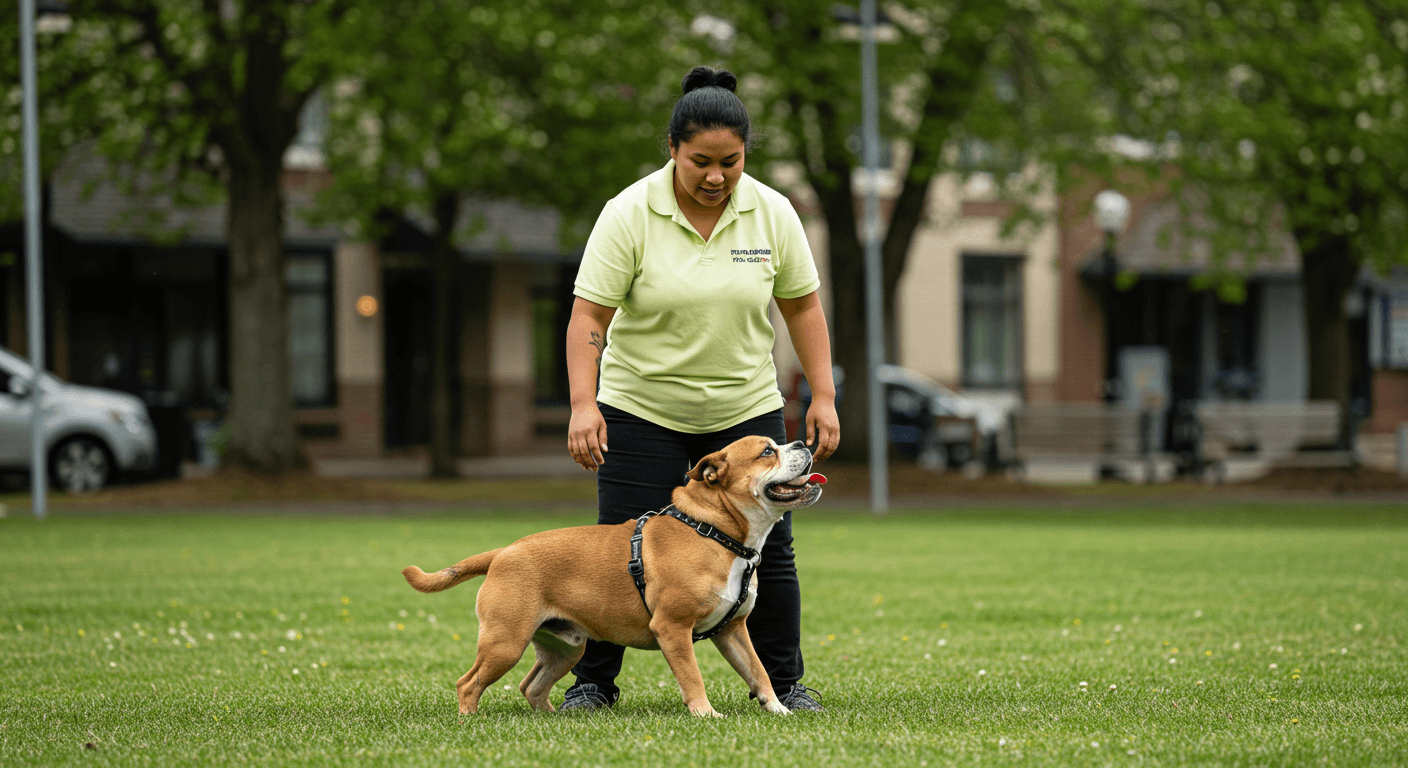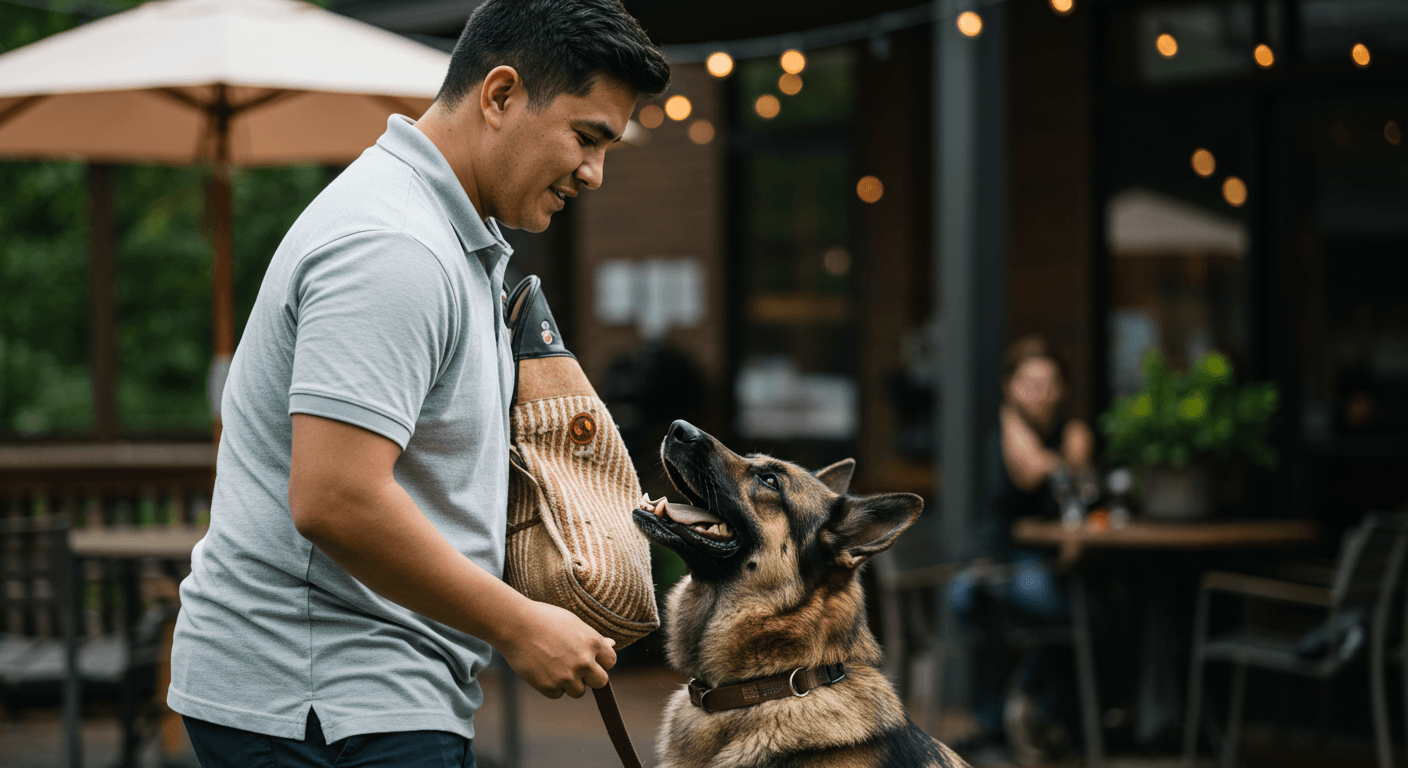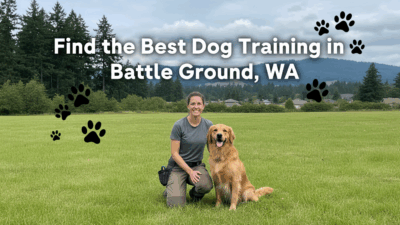Your Complete Guide to Choosing a Dog Trainer in Battle Ground, WA and Surrounding Areas
Living with a dog in Battle Ground means you’ll navigate quiet rural roads, enjoy trails at nearby parks, and likely visit local farm supply stores with your pup. Your dog needs to handle these everyday situations calmly, from walking on loose leash through the Heritage Farm complex to staying focused when chickens and horses appear along county roads.
Since Battle Ground sits in Clark County, local rules follow both city and county guidelines. When you find a trainer who understands these local details, you’ll get better results both at home and out in your community.
How to Choose the Right Trainer
Start by looking for someone who uses positive reinforcement training and can set realistic goals for your Battle Ground lifestyle. This means your dog should learn to walk calmly past livestock, stay polite during visits to local feed stores, and handle the mix of suburban neighborhoods and rural areas that define this region.
Credentials give you a quick way to compare trainers’ experience levels. Common dog trainer certifications include KPA-CTP, CPDT-KA, or IAABC-CDBC for behavior problems. If your dog has serious aggression issues, look for someone with CBCC-KA or a science-based program like CTC.
In-home dog training works great for puppy manners, door greetings, and building solid recall when you have acreage. Group classes make sense once your dog can focus around other dogs, especially before you try busier locations in Vancouver or Portland.
Common Dog Training Methods Explained

Reward-based methods build the trust you want while creating lasting behavior changes. They also help you follow Clark County’s rules about keeping dogs under control in public spaces.
Basic obedience covers sit, down, stay, place, recall, and leash training so your dog can handle walks, outdoor dining areas, and park visits without pulling or jumping on people. These fundamentals matter even more when you’re dealing with rural distractions like wildlife and farm animals.
Puppy training focuses on socialization, potty training, bite control, crate comfort, and early leash work. Starting with short, positive training sessions prevents bad habits from forming in the first place.
Behavior modification addresses fear, reactivity, resource guarding, or separation anxiety through careful desensitization and counterconditioning. For serious cases, ask if your trainer works with local veterinarians who understand behavior issues.
Private lessons let you customize everything around your daily routines, whether that means working on property boundaries, car manners for trips to Vancouver, or calm behavior around farm equipment. Day training can speed up results when you’re short on time.
Dog training classes help your dog practice good manners around other dogs and people. The best classes give dogs plenty of space, screen participants carefully, and teach calm behavior rather than just excitement.
Specialized work like therapy dog training or service dog training requires extra structure, public-access skills, and a very clear step-by-step training program. Board and train programs can be useful for intensive work, but make sure the facility uses humane methods and includes thorough handoff sessions.
Stay away from trainers who use fear, intimidation, or pain to get results. Humane methods are safer for everyone, easier to maintain long-term, and much better for keeping peace with your neighbors.
Average Cost of Dog Training in Battle Ground, WA and Surrounding Areas (Updated for 2025)
Prices around Battle Ground and Clark County depend on the trainer’s experience, how long training sessions last, and where the training happens. Here’s what most local pet owners are paying in 2025.
| Service Type | Average Cost (Battle Ground/Clark County) |
|---|---|
| Puppy classes (4-6 weeks) | $140-$260 total |
| Group obedience classes (4-6 weeks) | $150-$280 total |
| Private lessons (60-90 min) | $100-$180 per session |
| In-home coaching packages (4-6 visits) | $400-$850 total |
| Day training (trainer works your dog + handoff) | $425-$900 per week |
| Behavior consult for reactivity/anxiety (initial) | $140-$240 |
| Board and train (2-4 weeks) | $1,900-$4,200 total |
You’ll probably pay extra travel fees for longer distances within Clark County, and expect higher rates for complex behavior work. Many professional dog trainers offer a free consultation or free evaluation to help you understand what your dog needs.
Make sure you understand what’s included, how the trainer tracks progress, and whether ongoing support is part of the package.
Questions to Ask a Potential Dog Trainer
- What training methods do you use, and how do you keep sessions positive and low-stress?
- What credentials do you have, like CPDT-KA or CPDT-KSA? Do you keep up with continuing education?
- How will you customize the training program for my dog’s specific needs and our Battle Ground lifestyle?
- Do you offer in-home visits, group classes, or day training, and which approach fits my goals best?
- How will we measure my dog’s progress and know when to add more distractions like livestock or wildlife?
- What are the total costs, including any travel fees, and what’s your cancellation policy?
- Do you carry liability insurance, and can you show me proof?
- For behavior problems, will you work with my veterinarian if needed?
- What should I practice between our sessions to help my dog keep improving?
Local Battle Ground Rules and Considerations
Battle Ground enforces leash laws and nuisance rules to keep parks and neighborhoods safe for everyone. Clark County follows Washington State’s public health requirements too.
Leashes are required in all public spaces except inside designated off-leash dog parks. Keep a standard 6-foot leash with you for town parks, trails, and community events.
Washington State law requires current rabies vaccination for all dogs. You can get these through county clinics or your regular vet. Clark County Regional Dog Control handles licensing and animal control services.
Excessive barking can be considered a nuisance under Battle Ground municipal code, so work with your trainer on alert barking and separation anxiety before neighbors start complaining. This matters especially in the newer residential developments where homes sit closer together.
Washington State doesn’t require special licenses for dog trainers. If a business boards dogs for payment, they need to follow state and local business regulations and carry proper liability insurance.
Clark County Animal Protection and Control provides resources for licensing, lost pets, and other county services related to dogs.
Local Battle Ground Resources for Dog Owners
These spots give you great places to practice polite manners, work on recalls, and provide safe enrichment for your dog. Always follow the posted rules and etiquette guidelines.
- Battle Ground Lake State Park welcomes leashed dogs on trails and in day-use areas, making it perfect for practicing focus around other families, children, and wildlife while building your dog’s confidence on varied terrain.
- Kiwanis Park offers open fields and walking paths where you can work on leash skills and basic obedience around playground activity and other dogs.
- Lewisville Regional Park includes trails and natural areas where leashed dogs can practice calm behavior in a more wooded setting, ideal for dogs who need help with wildlife distractions.

FAQs
How much does in-home dog training cost?
Most Battle Ground trainers charge $100-$180 per in-home visit, with discounts available when you buy packages. Behavior problems typically start at the higher end of that range.
Is in-home dog training worth it?
Absolutely, because you’re working on problems exactly where they happen. Your trainer can fix door manners, jumping on guests, counter-surfing, and yard reactivity right at home, then step outside to practice leash skills on your actual property or neighborhood roads.
Can you pay someone to house train your dog?
Yes, many trainers offer puppy programs that include potty training, crate routines, and daily schedules. Day training can speed up the process while teaching you how to maintain the progress.
What is the 3-3-3 rule for dog training?
This is a helpful timeline for new or adopted dogs: expect about 3 days for your dog to decompress, 3 weeks to learn your routines, and 3 months to feel completely settled. Good training programs work with this natural adjustment period.
How long will it take to reach my training goals?
Most puppies and friendly adult dogs show solid progress within 4-8 weeks if you practice daily. Fear, reactivity, or aggression typically requires several months of careful behavior modification with gradual increases in difficulty.
What should I bring to group classes?
Pack a flat collar or harness, a 6-foot leash, high-value treats, water, and current vaccination records if your trainer requests them. Leave retractable leashes at home for safety reasons.
What’s the leash law in Battle Ground?
Dogs must be leashed and under control in all public areas, except inside designated off-leash dog parks. Keep that 6-foot leash handy for town parks, trails, and community events.
Do I need a dog license in Battle Ground or Clark County?
Yes, Clark County requires dog licenses for all dogs over six months old. You’ll need proof of current rabies vaccination to get your license through Clark County Animal Protection and Control.
What shots does my dog need in Clark County or Washington?
Rabies vaccination is required throughout Washington State. Your veterinarian may also recommend distemper-parvo, bordetella, and leptospirosis based on your dog’s lifestyle and exposure to wildlife or boarding facilities.
Are dog trainers required to be licensed in Battle Ground or Clark County or Washington?
No special trainer licenses exist in Washington State. Expert dog trainers follow normal business regulations, but no specific certification is required by law to offer dog training services.
Where can I practice off-leash recall?
Your best option is to use a fenced dog park or enclosed private property. For public spaces in Battle Ground and Clark County, dogs must remain on leash unless you’re in a designated off-leash area.
Which dog parks allow training around Battle Ground and surrounding areas?
Salmon Creek Off-Leash Dog Park in Vancouver offers fenced areas for safe off-leash practice. Vancouver also has several other off-leash parks within a short drive that provide secure spaces to work on recall and socialization.
What trails allow dogs for training?
Battle Ground Lake State Park welcomes leashed dogs on trails, making it ideal for building focus around distractions. Lucia Falls Park and Moulton Falls Regional Park also allow leashed dogs and offer beautiful natural settings for training work.
How do I find a certified dog trainer near me?
Look for trainers who list credentials like dog trainer certifications on their websites or business profiles. Ask about their education, methods, and whether they offer a free evaluation to discuss your dog’s needs.
What if my dog is reactive to livestock?
This is common in rural areas like Battle Ground where horses, chickens, and cattle are part of daily life. A professional dog trainer experienced in behavior modification can help your dog learn calm responses through gradual exposure and positive reinforcement training.
Can training help with separation anxiety?
Yes, behavior modification programs specifically address separation anxiety through systematic desensitization and building your dog’s confidence when alone. This work takes time and consistency but creates lasting change that helps your dog feel secure.
The right combination of thoughtful planning, humane methods, and consistent practice around Battle Ground’s parks and neighborhoods will help your dog become a confident, well-behaved dog. Whether you’re working on basic obedience or addressing serious behavior challenges, choosing a trainer who understands the local lifestyle makes all the difference.
